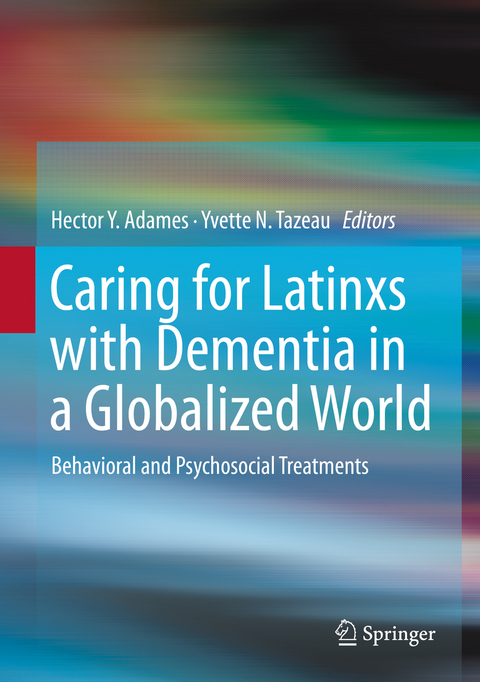
Caring for Latinxs with Dementia in a Globalized World
Springer-Verlag New York Inc.
978-1-0716-0130-3 (ISBN)
Highlighted topics featured in the book include:
Contextual, cultural, and socio-political issues of Latinxs with dementia.
New meta-analysis of dementia rates in the Americas and Caribbean.
Dementia-related behavioral issues and placement considerations.
Educational, diagnostic, and supportive psychosocial interventions.
Pharmacological, non-pharmacological, and ethnocultural healthcare interventions.
Intersectionality as a practice of dementia care for sexual and gender minoritized Latinxs.
Prescriptions for policy and programs to empower older Latinxs and their families.
Caring for Latinxs with Dementia in a Globalized World: Behavioral and Psychosocial Treatments is a resource that accentuates and contextualizes the heterogeneity in nationality, immigration, race, sexual orientation, gender, and political realities. It is a key reference for a wide range of fields inclusive of demography, geriatrics, gerontology, medicine, mental health, neurology, neuropsychology, nursing, occupational therapy, pharmacology, psychiatry, psychology, rehabilitation, social work, sociology, and statistics all of which, collectively, bear on the problem and the solutions for better care for Latinxs affected by dementia.
Hector Y. Adames, PsyD received his doctorate in Clinical Psychology from the American Psychological Association’s (APA) accredited program at Wright State University in Ohio. He completed his APA pre-doctoral internship at the Boston University School of Medicine’s Center for Multicultural Training in Psychology (CMTP), and APA-accredited post-doctoral fellowship in Clinical Neuropsychology at Boston University School of Medicine, Bedford Veterans Hospital. Currently, he is an Associate Professor at The Chicago School of Professional Psychology (TCSPP), Chicago campus. He co-founded and co-directs the Immigration, Critical Race, And Cultural Equity Lab (IC-RACE Lab), and has a small private practice in neuropsychology. Dr. Adames is the co-author of a textbook on Latinx Psychology titled, Cultural Foundations and Interventions in Latino/a Mental Health: History, Theory and within Group Differences published by Routledge Press (2017). His scholarship focuses on topics related to racism and colorism, Latinx Psychology, intersectionality, and cognitive health among People of Color. His academic work is published in many leading journals including the American Psychologist, Journal of Palliative & Supportive Care, Psychotherapy, Hispanic Journal of Behavioral Sciences, Professional Psychology: Research and Practice, Journal of Cross Cultural Psychology, and The Counseling Psychologist. He is the editor of Latinx Psychology Today (LPT), serves on the editorial board of The Counseling Psychologist, and Professional Psychology: Research & Practice, and is ad-hoc reviewer for several journals including the Archives of Clinical Neuropsychology among others. He has earned numerous awards and recognitions including the 2018 Distinguished Emerging Professional Research Award from The Society for the Psychological Study of Culture, Ethnicity, and Race, a Division of the American Psychological Association (APA). Yvette N. Tazeau, PhD is a Licensed Psychologist in independent practice in Silicon Valley. A third-generation Californian with Salvadoran heritage, she is a psychology graduate of Palo Alto University and University of California at Davis, and has been serving the San Francisco (SF) Bay Area in private practice since 1998. As a native speaker of the Spanish language, she provides bilingual (Spanish/English) services. She works across the developmental lifespan, with specialties including Geropsychology, Clinical Neuropsychology, Child psychology, and Industrial/Organizational psychology. Her clinical psychology psychotherapy services focus on Cognitive-Behavioral Therapy (CBT) and Interpersonal Therapy (IPT). Her clinical neuropsychology practice includes Cognitive Rehabilitation in addition to testing. She uses digital technologies for clinical treatment and incorporates mobile applications and virtual reality tools in her work. She has also created bilingual CBT mobile apps. Her interests and scholarship regarding Gerodiversity topics include clinical and biopsychosocial/behavioral interventions with Latino/a populations, as well as organizational development issues of geriatric mental health workforce planning. She has worked at SF Bay Area hospitals and clinics/agencies, for public school districts and private schools, has taught psychology graduate courses at local universities, and has published studies in scientific journals and chapters in scientific books. Her clinical training and work experiences include Stanford University School of Medicine’s Department of Psychiatry & Behavioral Sciences, Veterans Affairs Palo Alto Health Care System, The Children’s Health Council (Palo Alto), Gardner Family Health Network/Centro de Bienestar (San Jose), Alexian Hospital/Regional Medical Center, Alexian Brothers Senior Health Center, Santa Clara University, and Notre Dame de Namur University.
Chapter 1. Demographics and the Epidemiological Risk Factors for Dementia in Hispanic/Latino Populations.- Chapter 2. Contextual, Cultural, and Socio-political Issues in Caring for Latinxs with Dementia: When the Mind Forgets and the Heart Remembers.- Chapter 3. Meta-Analysis of Dementia Rates in Central America, South America, and the Caribbean.- Chapter 4. Treating Medical Comorbidities Associated with Dementia among Latinos.- Chapter 5. Functional Assessment in Latinos with Dementia: A Review of Tools and Cultural Considerations.- Chapter 6. Latinos with Dementia and Depression: Contemporary Issues and Assessment Challenges.- Chapter 7.Neurological, Psychiatric, and Affective Aspects of Dementia in Latinxs.- Chapter 8. Latino Families Living with Dementia: Behavioral Issues and Placement Considerations.- Chapter 9. Educational, Diagnostic, and Supportive Psychosocial Interventions for Latinos with Dementia.- Chapter 10. Cognitive Rehabilitation for Maintenance of Function in Latinos with Dementia.- Chapter 11. Behavioral Symptoms of Dementia in Latinos: Pharmacological, Non-pharmacological, and Ethnocultural Healthcare Interventions.- Chapter 12. Intersectionality as a Practice of Dementia Care for Sexual and Gender Minoritized Latinxs.- Chapter 13. Stress and Coping: Conceptual Models for Understanding Dementia among Latinos.- Chapter 14. Grief, Loss, and Depression in Latino Caregivers and Families affected by Dementia.- Chapter 15. Behavioral and Psychosocial Treatments of Dementia in Mexico.- Chapter 16. Dementia Care in Guatemala, Central America.- Chapter 17. Behavioral and Psychosocial Treatments of Dementia in the Caribbean: Cuba, Dominican Republic, and Puerto Rico.- Chapter 18. Dementia Treatment and Health Disparities among Puerto Ricans: The Impact of its Cultural and Political Histories .- Chapter 19. Dementia Diagnosis, Treatment, and Care in Colombia, South America.- Chapter 20. Behavioral and Psychosocial Treatments of Dementia in Spain.- Chapter 21. Community Partnerships and the Care of Latinos with Dementia: A Call for Action .- Chapter 22. Latinos and Dementia: Prescriptions for Policy and Programs that Empower Older Latinos and their Families.
| Erscheinungsdatum | 28.04.2020 |
|---|---|
| Zusatzinfo | 8 Illustrations, black and white; XXVI, 415 p. 8 illus. |
| Verlagsort | New York, NY |
| Sprache | englisch |
| Maße | 178 x 254 mm |
| Themenwelt | Geisteswissenschaften ► Psychologie ► Sozialpsychologie |
| Medizin / Pharmazie ► Medizinische Fachgebiete ► Geriatrie | |
| Medizin / Pharmazie ► Pflege | |
| Sozialwissenschaften ► Soziologie | |
| ISBN-10 | 1-0716-0130-X / 107160130X |
| ISBN-13 | 978-1-0716-0130-3 / 9781071601303 |
| Zustand | Neuware |
| Haben Sie eine Frage zum Produkt? |
aus dem Bereich


